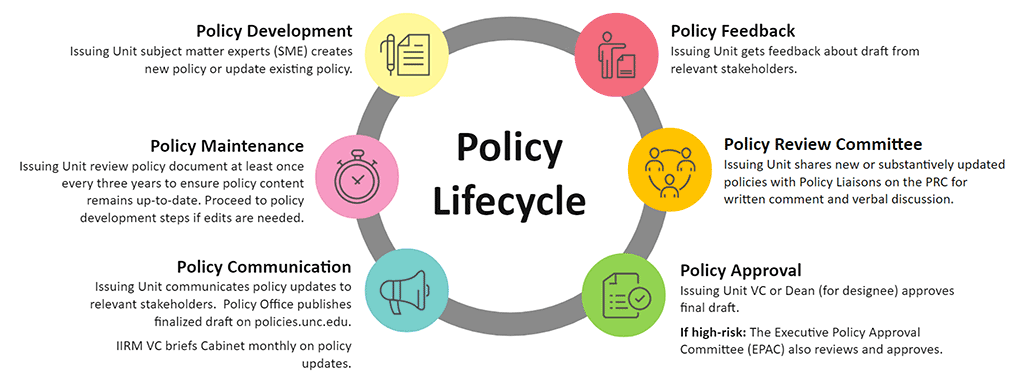Policy
Ethics and Policy is responsible for assisting University Units in the creation of new policy documents as well as editing existing policy documents. In addition, Ethics and Policy is responsible for maintaining a current and complete repository of all administrative policy documents. All University policies, procedures and standards are stored in the University Electronic Policy Repository. If you have general UNC-Chapel Hill policy questions, please contact Ethics and Policy.
Academic policies are not maintained through Ethics and Policy. Questions about academic policies should be directed to the University Registrar.
Policy Lifecycle
A detailed explanation of the University policy lifecycle is included in the University Policy Framework and University Procedure for Policy Management.

1. Policy Development
Issuing Unit subject matter experts create new policy or update existing policy.
2. Policy Feedback
Issuing Unit gets feedback about draft from relevant stakeholders.
3. Policy Review Committee (PRC)
Issuing unit shares new or substantively updated policies with Policy Liaisons on the PRC for written comment and verbal discussion.
4. Policy Approval
Issuing Unit Vice Chancellor or Dean (or designee) approves final draft.
If high-risk: the Executive Policy Approval Committee (EPAC) also reviews and approves.
5. Policy Communication
Issuing Unit communicates policy update to relevant stakeholders. Policy Office publishes finalized draft on policies.unc.edu. The Vice Chancellor for Institutional Integrity and Risk Management (IIRM) briefs cabinet monthly on policy updates.
6. Policy Maintenance
Issuing unit reviews policy document at least once every three years to ensure policy content remains up-to-date. Proceed to Policy Development step if edits are needed.
Policy Review Committee (PRC)
The University Policy Review Committee (PRC) includes individuals from units across campus known as Policy Liaisons. During its monthly meetings, the PRC discusses upcoming departmental and University policy changes. Liaisons also engage in professional learning opportunities related to policy on campus. The PRC is not an approval body for University policies, but instead serves as a group of individuals representing a variety of perspectives that provides feedback on potential policy changes and helps to communicate those changes out to the broader University community.
Committee Members and Records